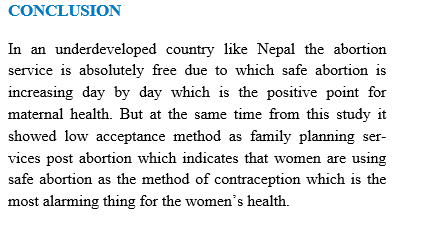Abstract
Background :
Safe abortion policy was started in 2002 to reduce the ma-ternal mortality and morbidity related to unsafe abortion. Promoting the use of contraceptive methods effectively reduces the abortion rate by pre-venting unintended pregnancy. In this study the acceptance and selection of contraceptive method following abortion was assessed.
Methods :
A descriptive retrospective study was conducted from 1st January 2016 till 31st December 2016 at Western Regional Hospital, Pokhara Nepal where
191 women were enrolled for the study.
Results : Among 191 wom-en mostly were from the age group of 20-29 (46.1%) and were Hindu (73.3%). Most of them were pregnant for more than one time (86.9%)
and do house work (57.6%). The main reason for abortion was due to complete family (67.5%) and the abortion was done by medical method (57.6%).
Around 52.4% of women did not choose any form of family planning methods post abortion which is most alarming for the govern-ment of Nepal.
Conclusion :
The abortion service is free in Nepal; most women did not use family planning after abortion which indicates repeat-ed abortion.
The good counseling pre and post abortion may be helpful to increase the rate of acceptance of family planning after abortion.
References
2.Kost K, Singh S, Vaughan B, Trussell J, Bankole A. Estimates of contraceptive failure from the 2002 National Survey of Family Growth. Contraception. 2008;77(1):10-21.
3.CREPHA. Nepal Comprehensive Abortion Care National Facility Based Abortion Survey 2006. Kathmandu [Nepal]: Government of Ne-pal, Centre for Research on Environment Health and Population Activ-ities,2006.
4.Ministry of Health and Population [Nepal], New ERA [Nepal], Mac-ro International Inc. Nepal Demographic and Health Survey 2006: Key Findings. Kathmandu, Nepal, and Calverton, Maryland, USA: Ministry of Health and Population, New ERA and Macro International Inc.2007.
5.Speroff L, Mishell DR. The postpartum visit: it’s time for a change in order to optimally initiate contraception. Contraception. 2008;78(2):90-8.
6.Rasch V, Yambesi F, Massawe S. Medium and long-term adherence to postabortion contraception among women having experienced unsafe abortion in Dar es Salaam, Tanzania. BMC Pregnancy and Childbirth. 2008;8(1):32.
7.Cheng Y, Xu X, Xu J, Wuillaume F, Zhu J, Gibson D, et al. The need for integrating family planning and postabortion care in China. Interna-tional Journal of Gynecology & Obstetrics. 2008;103(2):140-3.
8.Nobili MP, Piergrossi S, Brusati V, Moja EA. The effect of patient-centered contraceptive counseling in women who undergo a vol-untary termination of pregnancy. Patient education and counseling. 2007;65(3):361-8.
9.Lamichhane P, Harken T, Puri M, Darney PD, Blum M, Harper CC, et al. Sex-selective abortion in Nepal: a qualitative study of health work-ers’ perspectives. Women’s Health Issues. 2011;21(3):S37-S41.
10.Johns Hopkins Bloomberg School of Public Health Center for Com-munication Programs. Baseline Survey for the MNH Program in Three Districts of Nepal - Pregnant Woman Questionairre2002.
11.Sedgh G, Henshaw S, Singh S, Åhman E, Shah IH. Induced abortion: estimated rates and trends worldwide. The Lancet. 2007;370(9595):1338-45.
12.Tuladhar H, Marahatta R. Awareness and practice of family plan-ning methods in women attending gyne OPD at Nepal Medical College Teaching Hospital. Nepal Med Coll J 2008; 10(3):184-191.
13.Ferreira ALC, Souza AI, Lima RA, Braga C. Choices on contracep-tive methods in post-abortion family planning clinic in the northeast Brazil. Reproductive Health. 2010;7(1):5.
14.Khanal V, Joshi C, Neupane D, Karkee R. Practices and perceptions on contraception acceptance among clients availing safe abortion servic-es in Nepal. Kathmandu Univ Med J 2011;35(3):179-84.
15. Rasch V, Massawe S, Yambesi F, Bergstrom S. Acceptance of con-traceptives among women who had an unsafe abortion in Dar es Salaam. Tropical Medicine & International Health. 2004;9(3):399-405.
16. Mittal S. Contraception after medical abortion. Contraception. 2006;74(1):56-60.

